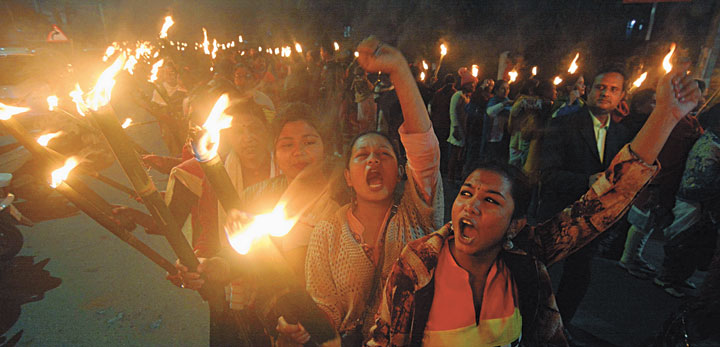Union home minister Amit Shah on Saturday invited a 14-member committee for talks in New Delhi on Sunday, but the All Assam Students Union (AASU) turned it down.
The invitation and the rejection came a day after the Centre brought the Citizenship (Amendment) Act into effect on Friday.
But four members of the committee, constituted to discuss implementing of Clause 6 of the Assam Accord which provides for constitutional safeguards to the Assamese people, will attend Sunday’s meeting, the chairman of the committee said on Saturday.
“We are not participating in Sunday’s meeting. The Centre must understand that Clause 6 can’t be equated with CAA. Clause 6 was our right for agreeing to accept foreigners till 1971 as per the Assam Accord. But it can’t be an answer to CAA, which seeks to grant citizenship to Hindu Bangladeshis till December 2014,” AASU chief adviser Samujjal Bhattacharjya said.
Committee chairman Justice (retd) Biplab Kumar Sharma, told The Telegraph that four members of the committee would attend the discussion on Sunday but “we have not yet received the agenda”. He said they hope to submit the report by January 15. “We received the formal invitation today (Saturday), will hold the discussion tomorrow and return on January 13,” he said.
The Centre has been saying that Assam’s interest would be protected through Clause 6 and requested the committee to submit its report in January to allay fears over CAA. But the anti-CAA brigade has made it clear that Clause 6 safeguards have nothing to do with CAA. Their reactions suggest that the agitation will only intensify in the days to come.
On Saturday, torchlight processions were taken out across the state against the “unconstitutional, anti-Assam Act”. Protesters burnt effigies of central and state leaders, waved black flags at ministers and MPs and raised slogans against the BJP government.
Bhattacharjya said bringing CAA into effect on Friday was an insult to the peaceful, democratic movement of the people of Assam.
“At a time when the state was preparing for Magh Bihu celebrations, the Centre’s move came as a dampener. Couldn’t they have waited till January 22, when the Supreme Court will hear the petitions challenging CAA? They rushed just to ensure that they get the votes of illegal migrants from Bangladesh. This is another injustice meted out to Assam, another betrayal by the government. However, AASU wants the people of Assam not to get upset. Our fight against this injustice will continue.”
AASU general secretary Lurinjyoti Gogoi said, “The BJP-led government has betrayed the people of Assam. It’s now the responsibility of the people to uproot it from the state.”
He also questioned state industry minister Chandra Mohan Patowary’s statement on Friday that the CAA protest had adversely impacting investments.
“AASU wants the minister to publish a white paper citing how many companies have withdrawn their investment and how many have invested in the state following the outbreak of the CAA protest.
The government is telling lies to defame our movement,” he alleged.
AJYCP general secretary Palash Changmai said, “The government has totally ignored the people of Assam.”
Changmai said, “We have to intensify the CAA agitation since it is no longer a movement only to scrap the Act but to constitutionally safeguard the Assamese people’s right over land, language, culture and identity.”
At Duliajan town in Dibrugarh district, where students, teachers, businessmen, housewives and traders participated in a torchlight procession organised by AASU and 30 indigenous groups, the AASU’s Dibrugarh unit secretary Shankar Jyoti Baruah said, “We will wait for the Supreme Court hearing on CAA on January 22. We hope the court will provide justice to the people of Assam. If the verdict goes against the people, we will launch protest programmes against the BJP-led governments at the Centre and in the state.”
In Tinsukia, protesters took out torchlight processions, burnt effigies of Prime Minister Narendra Modi, home minister Amit Shah and chief minister Sarbananda Sonowal, hoisted black flags and raised slogans at Doomdooma, Magherita and other places across the district. The AJYCP hoisted black flags across the district.
AJYCP joint secretary Devajit Sonar told The Telegraph, “We burnt effigies of central and state leaders and hoisted black flags to protest against CAA. We will take the agitation forward in a democratic and peaceful way.”
The AASU, AJYCP, All Moran Students Union, Bir Lachit Sena and 32 other organisations took part in the protest as did traders, intellectuals, farmers and artistes. As a result, shops remained closed and traffic came to a standstill on the national highways.
The CAA enforcement notification was issued on Friday, a day after Sonowal and his cabinet colleague Himanta Biswa Sarma flew to Delhi in a chartered flight to meet Shah.
As for Sunday’s discussion, the three AASU members, who are part of the 14-member high-power committee on Clause 6 implementation, headed by Justice (retd) Biplab Kumar Sharma, were invited by the home ministry along with the other members.
The three AASU members are its chief adviser Sammujal Bhattachajya, president Dipanka Nath and general secretary Lurinjyoti Gogoi.
The Union home ministry had reconstituted the committee in July last year to implement Clause 6 after the first one was dissolved in January last year after its members refused to be a part of it in protest against the Citizenship Amendment Bill (CAB). The Union cabinet had passed the bill on December 4, hours after a discussion between Shah and an AASU delegation over CAB.
The second committee’s brief is to assess and make recommendations for safeguarding the legal and constitutional rights of the indigenous people of the state, as provided by Clause 6. It has since held over 30 formal and numerous informal meetings here and in the districts with stakeholders.
Additional reporting by Manoj Kumar Ojha in Doomdooma and Pradip Kumar Neog in Duliajan











